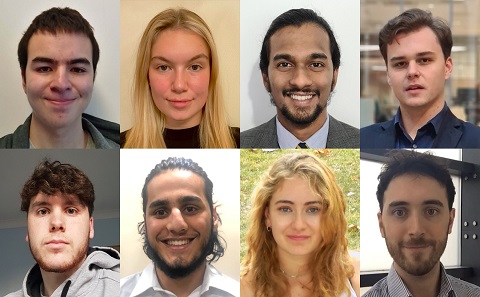Engineering student recognised for sustainable city design

Southampton Mechanical Engineering student Morgan Gillingham has won the opportunity to apply for internships and graduate roles at global technology company Siemens.
Morgan took part in the SustainaCity Racer Challenge – a sustainable transport competition run by Siemens to design the smart and sustainable transport system of the future.
He competed as part of the team TelePods at the two-day virtual event that challenged the 50 participants to create an intelligent, sustainable and interconnected network for a fictional city region, using a variety of transport types for citizens living in different environments.
Morgan’s team came joint runners-up in the competition and he was one of 22 successful students and graduates that were offered access to early career opportunities with Siemens Digital Industries, Siemens Smart Infrastructure, and Siemens Mobility businesses.
He said: “I was proud that we managed to do so well. I have a long-standing interest in how engineering can be applied to sustainability and I really enjoyed getting to work with students from a range of backgrounds, universities and degree subjects. That is something we don’t often get the chance to do.
“The experience solidified my belief that I want to work in the sustainable engineering sector and I am thankful to Siemens for this opportunity.”
Morgan, who is in the third year of his MEng Mechanical Engineering degree at Southampton, found out about the competition when he was looking for a placement and thought that it looked like an interesting opportunity and good experience to put on his CV.
He said: “I wanted to learn more about sustainability and increase my chances of getting a placement. We had to design a sustainable city and present it to a team of judges at the end of the day.
“The focus of the competition was on sustainability, specifically to travel, and how the travel industry could look in a smart city of the future with the minimisation of carbon footprint being a target.
“Some of the methods we came up with included the use of developing e-bikes and e-scooters using wholly recycled materials and charging stations being, at least partially, powered by energy harnessed from local gyms using running machines. This, and similar ways to reduce carbon footprint, are not too unrealistic and could come to fruition in the next three to five years.
“I think engineers can lead these developments using their manufacturing knowledge to substitute non-recyclable materials, or high energy during production materials, for less impactful materials without having to compromise performance.”
Thomas Edwards, Graduate Engineer for Siemens Digital Industries and one of the competition judges, said: “SustainaCity Racer was launched in 2020 as a way of bringing multidisciplinary minds together to collaborate to come up with innovative solutions to real-life problems and give students the opportunity to experience things that they may encounter if they worked at Siemens.
“We were extremely impressed with all 50 of the participants and the outstanding ideas they came up with to respond to the task of innovating in a new age of connected mobility that allows people to move more intelligently and sustainably.”
The University of Southampton is committed to an ambitious vision for a more sustainable University. Its Strategic Plan – Sustainability 2020-2025 sets out its aims to create a cleaner, greener and healthier University of Southampton by bringing together student, staff and local residents to improve sustainability across its estate, and manage its impact on the planet.